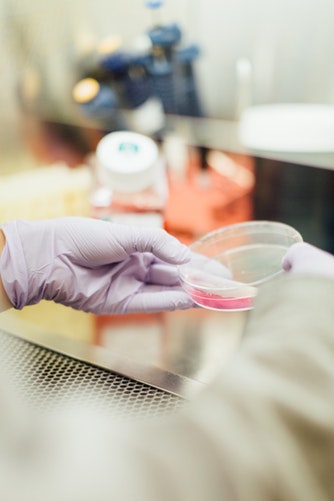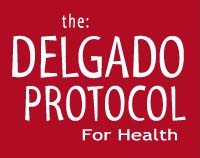 IGF-1, which is also referred to as somatomedin C, is a hormone with a similar chemical structure to insulin. IGF-1 production is stimulated by growth hormone (GH), and levels of it peak in adolescents and slowly decline after the age of 20.[i] IGF-1 plays an integral role in childhood growth but its usefulness does not end there – it has growth-promoting effects on nearly every cell in the body and is essential for cellular development and regeneration throughout life. Below is an outline of the myriad of health benefits associated with IGF-1 and the truth behind the supposed IGF-1 and cancer link.
IGF-1, which is also referred to as somatomedin C, is a hormone with a similar chemical structure to insulin. IGF-1 production is stimulated by growth hormone (GH), and levels of it peak in adolescents and slowly decline after the age of 20.[i] IGF-1 plays an integral role in childhood growth but its usefulness does not end there – it has growth-promoting effects on nearly every cell in the body and is essential for cellular development and regeneration throughout life. Below is an outline of the myriad of health benefits associated with IGF-1 and the truth behind the supposed IGF-1 and cancer link.
Longevity and Anti-Aging Benefits of IGF-1
Higher IGF-1 levels are associated with longer telomeres (the protective tips at the end of chromosomes), which is beneficial because aging is caused by the shortening of telomeres.[ii] IGF-1 also increases glutathione, which is a powerful antioxidant that helps protect cells and tissues from free radical damage, which is another major cause of aging and disease.[iii] An additional benefit of IGF-1 is that it reduces inflammation, which is the root cause of most chronic diseases.[iv][v] [vi] The anti-inflammatory and antioxidant effects that IGF-1 has on blood vessels, helps to prevent plaque build-up and may thereby help reduce the risk for America’s leading killers — heart disease and stroke.[vii] IGF-1 is also the most potent stimulator of collagen, and can help keep skin tight and wrinkle-free.[viii]
Health Benefits
 Preliminary research suggests IGF-1 may help fight depression and anxiety, speed-up mental processing, and reduce the risk for Alzheimer’s and other forms of dementia.[ix][x] IGF-1 helps lower blood sugar, improve insulin sensitivity and may reduce the risk for metabolic syndrome, obesity and diabetes.[xi] IGF-1 may also help enhance bone density, promote healing, improve gut health, fight inflammatory bowel diseases, reduce the risk for autoimmune diseases and boost the immune system.[xii][xiii] Of all the benefits that IGF-1 produces, it is perhaps most well-known for its ability to build muscles and reduce muscle loss caused by aging and disease.[xiv] It is highly touted for its ability to enhance athletic performance, increase strength and speed, reduce fat, and improve endurance.
Preliminary research suggests IGF-1 may help fight depression and anxiety, speed-up mental processing, and reduce the risk for Alzheimer’s and other forms of dementia.[ix][x] IGF-1 helps lower blood sugar, improve insulin sensitivity and may reduce the risk for metabolic syndrome, obesity and diabetes.[xi] IGF-1 may also help enhance bone density, promote healing, improve gut health, fight inflammatory bowel diseases, reduce the risk for autoimmune diseases and boost the immune system.[xii][xiii] Of all the benefits that IGF-1 produces, it is perhaps most well-known for its ability to build muscles and reduce muscle loss caused by aging and disease.[xiv] It is highly touted for its ability to enhance athletic performance, increase strength and speed, reduce fat, and improve endurance.
The IGF-1 and Cancer Myth
Some people claim that IGF-1 causes the growth of cancer, because as a growth hormone, its primary function is to make things grow, but the accusation is unfounded. Yes, studies have found an association between very high levels of IGF-1 and some types of cancer, but no study has proven that IGF-1 is the actual cause of the cancer.[xv] Many experts now agree, IGF-1 is not the cause of cancer, but a consequence of it. High IGF-1 can indicate the presence of an undetected tumor, and the higher IGF-1 levels found in cancer patients is likely caused because the tumor is secreting IGF-1. [xvi][xvii] Another explanation for the IGF-1-cancer link, is that IGF-1 plays a prominent role in the regulation of immunity and inflammation and the body may increase IGF-1 levels in response to the immunosuppression and inflammation that cancer causes.[xviii] Also worth noting is the fact that higher IGF-1 levels are associated with less invasive types of breast cancer in women, and low IGF-1 is linked to uterine cancer.[xix]
How to Boost Health and IGF-1 Levels Safely, and Naturally
Dairy and meat boost IGF-1 levels, but we urge you not to consume animal products for this purpose. Omnivores have a much higher risk for cancer, and most other deadly chronic diseases.[xx] Consuming a whole-foods, plant-based diet, that is void of processed oils, and packaged foods is the absolute best way to boost your health and protect yourself from cancer. You can safely increase your IGF-1 levels with plant-based amino acids and soy is one of the most powerful vegan IGF-1 boosters. Concentrate on eating unprocessed and fermented soy products such as edamame, miso, tempeh, and Natto. Don’t over-do it though — 2 to 4 servings per day is more than enough; and avoid artificial soy products such as tofu burgers and cheeses because they are highly processed and unhealthy. You can also boost IGF-1 using a sublingual growth factor spray, such as Grow Young. Grow Young contains protein peptides that safely stimulate your body’s own release of IGF-1 and other helpful growth factors.
Considerations
More research needs to be done to determine the exact reason why cancer patients have higher IGF-1 levels. However, so long as you don’t already have cancer, you can optimize your IGF-1 levels without worrying that you are causing harm. But remember the key to health is always balance, you don’t want you IGF-1 levels to be too low, and you also don’t want them to be unnaturally high. So long as you are using the natural methods described above, you shouldn’t have to worry about your levels becoming excessive.
Further Research:
https://www.youtube.com/watch?v=Na5R0bdNjZs
https://www.youtube.com/watch?v=8jSEQFSjekI&list=PLVLgBR3AfFG_O7injtvVMFo7wcGFM64om
References
[i] https://www.ncbi.nlm.nih.gov/pubmed/24845759
[ii] https://www.ncbi.nlm.nih.gov/pubmed/19913048?dopt=Abstract
[iii] https://www.ncbi.nlm.nih.gov/pmc/articles/PMC3557755/
[iv] https://www.ncbi.nlm.nih.gov/pmc/articles/PMC2492581/
[v] http://www.sciencedirect.com/science/article/pii/S1734114016000335
[vi] https://www.ncbi.nlm.nih.gov/pubmed/17916769
[vii] https://translational-medicine.biomedcentral.com/articles/10.1186/1479-5876-10-224#Sec12_1361
[viii] https://www.ncbi.nlm.nih.gov/pubmed/22233457
[ix] https://www.ncbi.nlm.nih.gov/pubmed/17342171/
[x] https://www.ncbi.nlm.nih.gov/pubmed/12415260
[xi] https://translational-medicine.biomedcentral.com/articles/10.1186/1479-5876-10-224#Sec12_1361
[xii] https://www.ncbi.nlm.nih.gov/pubmed/8418780
[xiii] https://www.embl.de/aboutus/communication_outreach/media_relations/2014/141022_Monterotondo/
[xiv] http://www.physiology.org/doi/full/10.1152/jappl.1998.84.5.1716
[xv] http://cancerres.aacrjournals.org/content/63/14/3991
[xvi] https://www.youtube.com/watch?v=u2xEpwU99r4
[xvii] http://cancerres.aacrjournals.org/content/63/14/3991
[xviii] http://www.sciencedirect.com/science/article/pii/S1359610198000227
[xix] https://www.youtube.com/watch?v=u2xEpwU99r4
[xx] https://www.ncbi.nlm.nih.gov/pmc/articles/PMC2121650/



